将来时理论及练习
(完整版)一般将来时态讲解及练习和答案
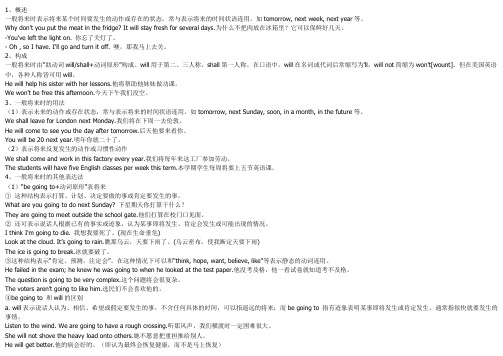
1、概述一般将来时表示将来某个时间要发生的动作或存在的状态,常与表示将来的时间状语连用,如tomorrow, next week, next year等。
Why don’t you put the meat in the fridge? It will stay fresh for several days.为什么不把肉放在冰箱里?它可以保鲜好几天。
-You've left the light on. 你忘了关灯了。
- Oh , so I have. I'll go and turn it off. 噢,那我马上去关。
2、构成一般将来时由“助动词will/shall+动词原形”构成。
will用于第二、三人称,shall第一人称。
在口语中,will在名词或代词后常缩写为'll,will not简缩为won’t[wount]。
但在美国英语中,各种人称皆可用will。
He will help his sister with her lessons.他将帮助他妹妹做功课。
We won't be free this afternoon.今天下午我们没空。
3、一般将来时的用法(1)表示未来的动作或存在状态,常与表示将来的时间状语连用,如tomorrow, next Sunday, soon, in a month, in the future等。
We shall leave for London next Monday.我们将在下周一去伦敦。
He will come to see you the day after tomorrow.后天他要来看你。
You will be 20 next year.明年你就二十了。
(2)表示将来反复发生的动作或习惯性动作We shall come and work in this factory every year.我们将每年来这工厂参加劳动。
将来时练习题及讲解高中
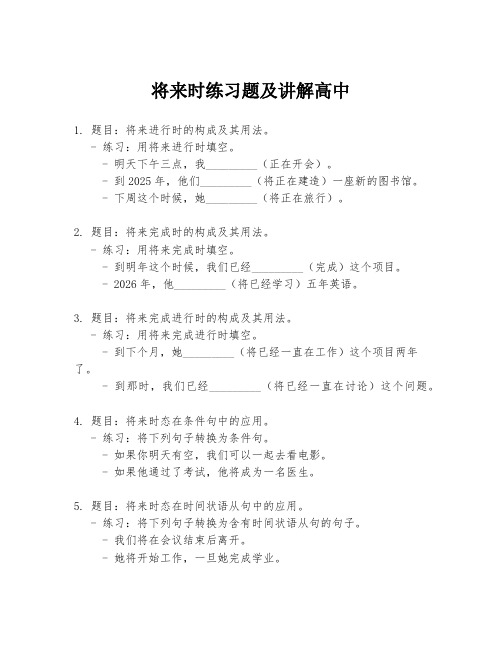
将来时练习题及讲解高中1. 题目:将来进行时的构成及其用法。
- 练习:用将来进行时填空。
- 明天下午三点,我_________(正在开会)。
- 到2025年,他们_________(将正在建造)一座新的图书馆。
- 下周这个时候,她_________(将正在旅行)。
2. 题目:将来完成时的构成及其用法。
- 练习:用将来完成时填空。
- 到明年这个时候,我们已经_________(完成)这个项目。
- 2026年,他_________(将已经学习)五年英语。
3. 题目:将来完成进行时的构成及其用法。
- 练习:用将来完成进行时填空。
- 到下个月,她_________(将已经一直在工作)这个项目两年了。
- 到那时,我们已经_________(将已经一直在讨论)这个问题。
4. 题目:将来时态在条件句中的应用。
- 练习:将下列句子转换为条件句。
- 如果你明天有空,我们可以一起去看电影。
- 如果他通过了考试,他将成为一名医生。
5. 题目:将来时态在时间状语从句中的应用。
- 练习:将下列句子转换为含有时间状语从句的句子。
- 我们将在会议结束后离开。
- 她将开始工作,一旦她完成学业。
6. 题目:使用“will”和“be going to”表达将来时态的区别。
- 练习:选择正确的动词形式填空。
- 我_________(will/am going to)参加明天的会议。
- 他_________(will/is going to)成为一名工程师,因为他已经决定学习工程学。
7. 题目:使用“be about to”表达即将发生的动作。
- 练习:用“be about to”填空。
- 门铃响了,我_________(即将)去开门。
- 飞机_________(即将)起飞。
8. 题目:将来时态在间接引语中的应用。
- 练习:将直接引语转换为间接引语。
- 他说:“我明天会来。
”- 她说:“我会在下个月完成这个项目。
”讲解- 将来进行时:由“will be + 动词的现在分词”构成,用来表示将来某个时间正在进行的动作。
一般将来时(讲义及答案)
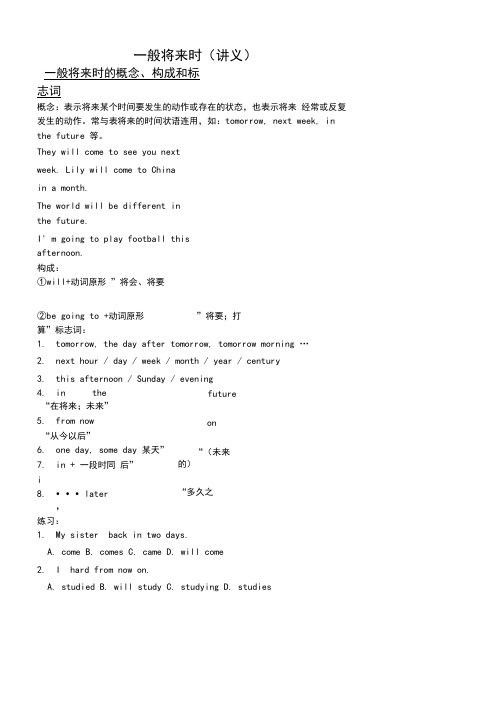
一般将来时(讲义)一般将来时的概念、构成和标志词概念:表示将来某个时间要发生的动作或存在的状态,也表示将来 经常或反复发生的动作。
常与表将来的时间状语连用,如:tomorrow, next week, inthe future 等。
They will come to see you nextweek. Lily will come to Chinain a month.The world will be different inthe future.I' m going to play football thisafternoon.构成:①will+动词原形 ”将会、将要②be going to +动词原形 ”将要;打算”标志词:1. tomorrow, the day after tomorrow, tomorrow morning…2. next hour / day / week / month / year / century3. this afternoon / Sunday / evening4. in the “在将来;未来”5. from now “从今以后”6. one day, some day 某天”7. in + 一段时同 后” i8. •••later ,练习:1. My sister back in two days.A. comeB. comesC. cameD. will come2. I hard from now on.A. studiedB. will studyC. studyingD. studies futureon“(未来的)“多久之3.后天Tcm将要离开北京-(翻径)_____________________4.中国将会变得更强大,(翻修)______________________5.They will visit Zhengzhou next month.(写出同义句)6.When will you leave for China (写出同义句)When you句式变换She will be angry with him.否定句:She will not be angry with him. /She won, t be angry with him. 一般疑问句:Will she be angry with him 回答:Yes, she will. / No, shewon , t.特殊疑问句:Who will she beangry with注意:will可缩写为'11, will not可缩写为won' t /wa u nt/练习:1.这个周末他不会去钓鱼。
一般将来时讲解及练习(含答案)
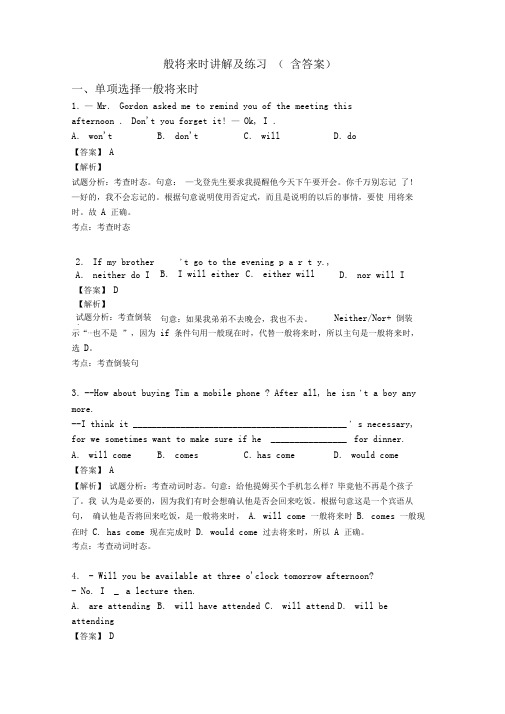
般将来时讲解及练习(含答案)一、单项选择一般将来时1.—Mr.Gordon asked me to remind you of the meeting thisafternoon .Don't you forget it! —Ok, I .A.won't B.don't C.will D.do【答案】A【解析】试题分析:考查时态。
句意:—戈登先生要求我提醒他今天下午要开会。
你千万别忘记了!—好的,我不会忘记的。
根据句意说明使用否定式,而且是说明的以后的事情,要使用将来时。
故A 正确。
考点:考查时态2.If my brother doesn 't go to the evening p a r t y.,A.neither do I B.I will either C.either willI D.nor will I【答案】D 【解析】试题分析:考查倒装句:句意:如果我弟弟不去晚会,我也不去。
Neither/Nor+ 倒装句,表示“⋯也不是”,因为if 条件句用一般现在时,代替一般将来时,所以主句是一般将来时,选D。
考点:考查倒装句3.--How about buying Tim a mobile phone ? After all, he isn 't a boy any more.--I think it _____________________________________________ ' s necessary, for we sometimes want to make sure if he ________________ for dinner. A.will come B.comes C.has come D.would come【答案】A【解析】试题分析:考查动词时态。
句意:给他提姆买个手机怎么样?毕竟他不再是个孩子了。
我认为是必要的,因为我们有时会想确认他是否会回来吃饭。
一般将来时讲解与练习
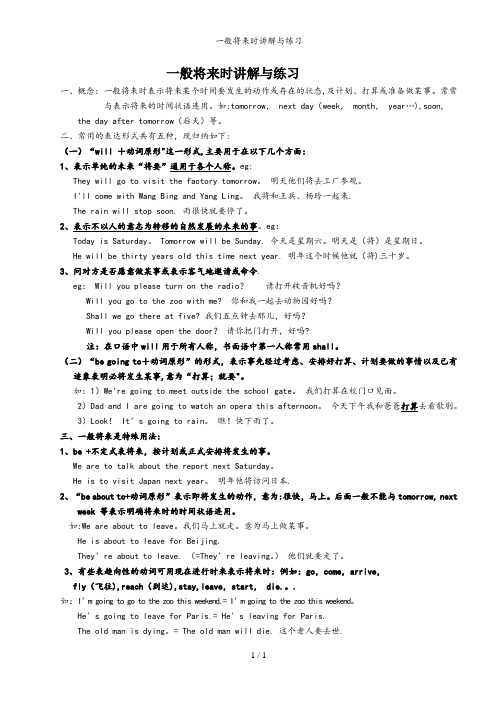
一般将来时讲解与练习一、概念:一般将来时表示将来某个时间要发生的动作或存在的状态,及计划、打算或准备做某事。
常常与表示将来的时间状语连用。
如:tomorrow, next day(week, month,year…),soon, the day after tomorrow(后天)等。
二、常用的表达形式共有五种,现归纳如下:(一)“will+动词原形"这一形式,主要用于在以下几个方面:1、表示单纯的未来“将要”通用于各个人称。
eg:They will go to visit the factory tomorrow。
明天他们将去工厂参观。
I'll come with Wang Bing and Yang Ling。
我将和王兵、杨玲一起来.The rain will stop soon. 雨很快就要停了。
2、表示不以人的意志为转移的自然发展的未来的事。
eg:Today is Saturday。
Tomorrow will be Sunday. 今天是星期六。
明天是(将)是星期日。
He will be thirty years old this time next year. 明年这个时候他就(将)三十岁。
3、问对方是否愿意做某事或表示客气地邀请或命令.eg: Will you please turn on the radio?请打开收音机好吗?Will you go to the zoo with me? 你和我一起去动物园好吗?Shall we go there at five? 我们五点钟去那儿,好吗?Will you please open the door?请你把门打开,好吗?注:在口语中will用于所有人称,书面语中第一人称常用shall。
(二)“be going to+动词原形”的形式,表示事先经过考虑、安排好打算、计划要做的事情以及已有迹象表明必将发生某事,意为“打算;就要"。
英语中一般将来时的总结与练习题

英语中一般将来时的总结与练习题一、一般将来时的总结1. 一般将来时的定义一般将来时表示将来某个时间要发生的动作或存在的状态,也常用于表示将来一段时间内的经常性动作或状态。
在英语中,一般将来时主要由助动词“will”或“shall”(第一人称)加动词原形构成。
此外,“be going to + 动词原形”也可表示将来时,常用于根据目前已知的情况预测未来即将发生的动作或状态。
2. 一般将来时的常见形式•“will + 动词原形”•“shall + 动词原形”(第一人称)•“be going to + 动词原形”•“be to do”结构(表示按计划或安排即将发生的动作)•“be about to + 动词原形”(表示即将发生的动作,不能与表示将来的时间状语连用)3. 一般将来时的用法•表示将来的动作或状态,通常与表示将来的时间状语连用,如“tomorrow”, “next year”, “in the future”等。
•表示根据现有情况推测未来可能发生的动作或状态,常用于“be going to”结构中。
•表示计划、安排或打算做的事情,常与“be to do”结构连用。
4. 与其他时态的区别•与现在进行时区别:现在进行时表示正在进行的动作,而一般将来时表示将来某个时间要发生的动作。
•与现在完成时区别:现在完成时表示过去发生的动作对现在造成的影响或结果,而一般将来时则表示未来即将发生的动作。
二、一般将来时的练习题1. 选择题(1) —_____ you _____ a party next weekend?—Yes, we will.A. Will; haveB. Are; havingC. Do; haveD. Are; go to have(2) They _____ a meeting this afternoon.A. are havingB. are going to haveC. will havingD. will have(3) —_____ you _____ your homework before you watch TV?—Yes, I _____.A. Will; do; willB. Are; doing; amC. Are; going to do; amD. Will; do; am2. 填空题(1) I _____ (meet) my friend at the airport tomorrow.(2) They _____ (not go) to the zoo if it rains.(3) We _____ (have) a picnic next Sunday. Will you join us?3. 翻译题(1) 明天我要去看望我的祖父母。
【英语】一般将来时讲解及练习(含答案)

【英语】一般未来时解说及练习(含答案)一、单项选择一般未来时1.---- James, do you know it’ s Kate’ s birthday tomorrow?---- Really? I ______ her a present after work this afternoon.A. will buy C. am buying B.am going to buy D. am to buy【答案】A【分析】试题剖析:观察时态。
句意:杰姆斯,你知道明日是凯特的诞辰吗?真的吗?我今日下午下班后会给他买一个礼品。
买礼品的动作未来某一时辰做的事情,用一般未来时。
应选A。
考点:观察时态。
2.However hard he tries, the recorder.A. didn ’ t work B. won’ t work C. isn ’ t working D. hasn ’ t worked 【答案】 B【分析】试题剖析:观察will 用法。
句意:不论他多么努力试试,这个录音机就不工作了。
此题中的 will 表示的是一种偏向性,如 The door won ’t open故. B 正确。
考点:观察 will 用法评论:神态动词 will 有多种不一样的用法, will 能够表示暂时决定做某事;或许表示未来时。
3.If my brother doesn A. neither do I’ t go to the evening party,.B. I will either C. either will I D. nor will I【答案】 D【分析】试题剖析:观察倒装句:句意:假如我弟弟不去晚会,我也不去。
Neither/Nor+倒装句,表示“ 也不是”,由于 if 条件句用一般此刻时,取代一般未来时,所以主句是一般未来时,选 D。
考点:观察倒装句4. Japan ’ s economy _______ in the past twenty years. No one knows how long it ______ before it regains its increase.A. has been declining; will be C. had been in decline; would take 【答案】 A B.has declined; would be D. was on the decline; will take【分析】试题剖析:观察动词的时态和语态,。
英语一般将来时的基本方法技巧及练习题及练习题(含答案)
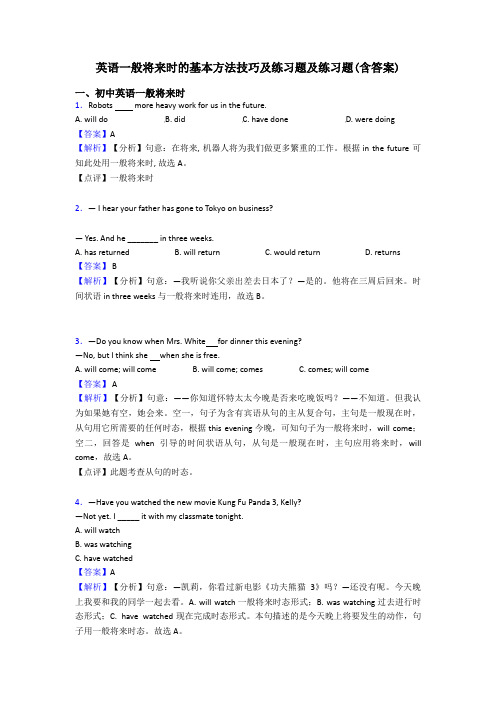
英语一般将来时的基本方法技巧及练习题及练习题(含答案)一、初中英语一般将来时1.Robots more heavy work for us in the future.A. will doB. didC. have doneD. were doing【答案】A【解析】【分析】句意:在将来, 机器人将为我们做更多繁重的工作。
根据in the future 可知此处用一般将来时, 故选A。
【点评】一般将来时2.— I hear your father has gone to Tokyo on business?— Yes. And he _______ in three weeks.A. has returnedB. will returnC. would returnD. returns【答案】 B【解析】【分析】句意:—我听说你父亲出差去日本了?—是的。
他将在三周后回来。
时间状语in three weeks与一般将来时连用,故选B。
3.—Do you know when Mrs. White for dinner this evening?—No, but I think she when she is free.A. will come; will comeB. will come; comesC. comes; will come【答案】 A【解析】【分析】句意:——你知道怀特太太今晚是否来吃晚饭吗?——不知道。
但我认为如果她有空,她会来。
空一,句子为含有宾语从句的主从复合句,主句是一般现在时,从句用它所需要的任何时态,根据this evening今晚,可知句子为一般将来时,will come;空二,回答是when引导的时间状语从句,从句是一般现在时,主句应用将来时,will come,故选A。
【点评】此题考查从句的时态。
4.—Have you watched the new movie Kung Fu Panda 3, Kelly?—Not yet. I _____ it with my classmate tonight.A. will watchB. was watchingC. have watched【答案】A【解析】【分析】句意:—凯莉,你看过新电影《功夫熊猫3》吗?—还没有呢。
一般将来时知识点总结及经典习题(含答案)

14.-- Tommy, do you know if they _____ to the zoo this Sunday if it _____?
-- Sorry, I have no idea.
【点评】考查动词的时态。
15.—Have you finished the poster for the party?
—Not yet. Iit in two days.
A. finish B. finished C. will finish D. have finished
【答案】C
【解析】【分析】此题的关键点在“in two days”和一般将来时连用,故选C。句意是:—你已经完成聚会的海报了吗?—还没有,我会在两个以后完成的。
A. will come; will come B. will come; comes C. comes; will come
【答案】A
【解析】【分析】句意:——你知道怀特太太今晚是否来吃晚饭吗?——不知道。但我认为如果她有空,她会来。空一,句子为含有宾语从句的主从复合句,主句是一般现在时,从句用它所需要的任何时态,根据this evening今晚,可知句子为一般将来时,will come;空二,回答是when引导的时间状语从句,从句是一般现在时,主句应用将来时,will come,故选A。
12.Many scientists believe that robotsable to talk like humans in 50 years.
A. were B. are C. will be D. have been
will表示将来时知识点及复习练习题

will 表示未来时知识点及练习题will表示未来时一、观点(1)表示未来某个时间要发生的动作或许存在的状态。
We shall go to see him tomorrow.我们明日去看他。
(2)表示未来常常或许频频发生的动作。
From now on I will come everyday.从此刻起,我将每日来。
★ will表未来时态,后来常跟的时间状语:tomorrow明日, the day after tomorrow后天,next week 下周 , this Sunday这个星期天, in+此后的时间,in the future在未来。
二、一定句构造主语 + shall / will +V原形She will arrive tomorrow.她明日到。
★shall 与 will 的差别shall :常用于第一人称否认式 : shall not=shan’twill:常用于第二、第三人称,但在口语中各样人常都能够用will否认式: will not=won’t三、否认句构造主语 + shall / will+ not +V原形She will not arrive tomorrow.他明日不会到。
四、一般疑问句构造Shall/Will+ 主语 +V原形一定回答: Yes, I/we + shall. / Yes.主语+will.否认回答: No, I/we shan’t./No,主语+ won’t.— Will she arrive tomorrow?她明日会到吗?—Yes,she will. / No, she won’t.五、 will/shall的特别用法(1)主语是第一人称 I,we 时,常用助动词 shall+V 原形I shall write you a letter next month.我下星期将会给你写信。
(2)在问对方能否愿意,或许表示客气的邀请时,常用will.Will you go to the zoo with me?你能和我一同去动物园吗?(3 )在表示建议或许征采对方建议时,用shall.Shall we go at ten?我们能够十点钟走吗?六、 be going to与will的差别:(1) be going to表示近期、目前就要发生的事情,will表示的未来时间则较远一些,①He is going to write a letter tonight.②He will write a book one day.(2) be going to表示依据主观判断未来一定发生的事情,will 表示客观大未来必然发生的事情。
一般将来时知识点及练习(含答案)
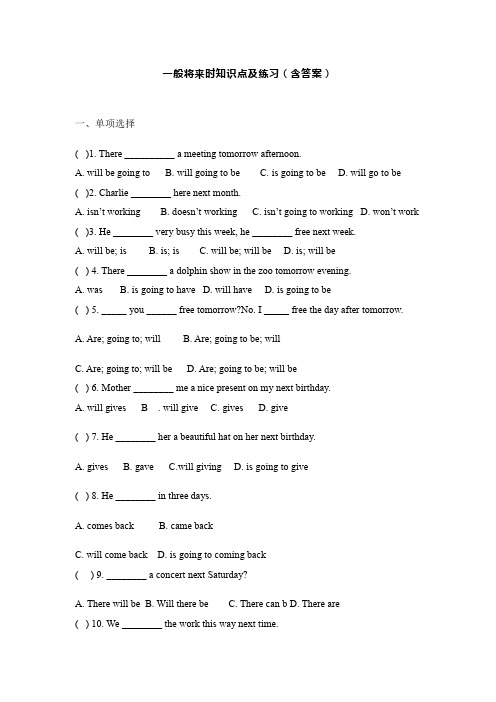
一般将来时知识点及练习(含答案)一、单项选择()1. There __________ a meeting tomorrow afternoon.A. will be going toB. will going to beC.is going to beD. will go to be ()2. Charlie ________ here next month.A. isn’t workingB. doesn’t workingC.isn’t going to workingD. won’t work ()3. He ________ very busy this week, he ________ free next week.A. will be; isB. is; isC.will be; will beD. is; will be()4. There ________ a dolphin show in the zoo tomorrow evening.A. wasB. is going to have D.will have D. is going to be() 5. _____ you ______ free tomorrow?No. I _____ free the day after tomorrow. A. Are; going to; will B. Are; going to be; willC. Are; going to; will beD. Are; going to be; will be()6. Mother ________ me a nice present on my next birthday.A. will givesB. will giveC. givesD. give()7. He ________ her a beautiful hat on her next birthday.A. givesB. gaveC.will givingD. is going to give()8. He ________ in three days.A. comes backB. came backC. will come backD. is going to coming back( ) 9. ________ a concert next Saturday?A. There will beB. Will there beC. There can bD. There are()10. We ________ the work this way next time.A. doB. will doC. going to doD. will doing() 11. Tomorrow he ___ a kite in the open air first, and then ____ boating in the park.A. will fly; will goB. will fly; goesC. is going to fly; will goesD. flies; will go () 12. The day after tomorrow they ________ a volleyball match.A. will watchingB. watchesC. is watchingD. is going to watch() 13. They ________ an English evening next Sunday.A. are havingB. are going to haveC. will havingD. is going to have()14. ________ you ________ free next Sunday?A. Will; areB. Will; beC. Do; beD. Are; be()15. He ________ there at ten tomorrow morning.A. willB. isC. will beD. be()16. It ________ the year of the horse next year.A. is going to beB. is going toC.will beD. will is()17. ________ open the window?A. Will you pleaseB. Please will youC.You pleaseD. Do you()18.Let’s go out to play football, shall we?OK. I ________.A. will comingB. be going to come e D. am coming()19. It ________ us a long time to learn English well.A. takesB. will takeC.spendsD. will spend()20. The train ________ at 11.A. going to arriveB. will be arriveC. is going toD. is arriving()21.In the near future, there ____ self-driving cars in our city.A. isB. wasC. areD. will be()22.Is there a hospital nearby? I hurt my ankle, and cannot move now.It’s about 3 blocks away. I _____ you there.A.took B.take C.will take D.have taken( )23.There _______ a football match next week. Shall we ______ and watch it?A.will have, to go B. will be ;go C. are going to be , go D. is going to have ,go( )24. There ______ more roads, parks and tall buildings in Fuzhou.A.will haveB. is going to haveC. will beD. is going to be( )25.There ______ a volleyball game in the school gym this evening.Let`s go to watch it together.A. hasB. is going to beC. have( )26. There ___________ a football match and two basketball matches next week.A.isB. are going to beC. is going to beD. are()27. There ________ a birthday party this Sunday.A. shall beB. will beC. shall going to beD. will going to be( )28.-І_______а рісnіс thіѕ wееkеnd. Wоuld уоu like tо gо wіth mе?A. have .B. am havingC. am going to have( )29. Tom and his sister _________ volleyball tomorrow afternoon.A.is going to playB. are going to playC. are playingD. is playing( )30. Tracy ______________ a volleyball player when she grows up.A. isB. wantsC. is going to beD. wants to( )31. There ______two concerts this evening. ---Exciting news.A.are going to beB. is going to beC. is going to haveD. will have( )32.Dad________ the USA in two weeks.A.is leave forB. leaves forC. is leaving forD. left for( )33. There _______ an English party in our class next week.A.is going to have B. is going to beC. will have D. have( )34. —Will you join us?—_______A.No, I didn’t.B. You’re welcome.C. I hope not.D. Of course, I will.( )35. Would you like to climb mountains with me this Sunday?I’d love to. But I _______ play table tennis against Class Three.A.am goingB. am going toC. amD. going to( )36.There_____ an English exam tomorrow.A. will haveB. is going to haveC. will be( )37.---Are you busy this afternoon? ---No.I _____to watch a football match.A.am going B.will C.shall D.can( )38.There___ two English films next week.A.is going to be B.are going to have C.will have D.are going to be( )39. There a talk show on CCTV at nine this evening.A.will have B、is going to be C、is going to have D、is having二、造句。
将来时理论及练习

将来时理论及练习一、概念:表示将要发生的动作或存在的状态及打算、计划或预备做某事。
句中一般有以下时间状语:tomorrow,nextday(week,month,year…),soon,thedayaftertomorrow(后天)等。
二、基本结构:①begoingtodo;②willdo.三、否定句:在be动词(am,is,are)l之后加not,或在情态动词will之后加not,以形成will not。
例如:i’mgoingtohaveapicnicthisafternoon.→i’mnotgoingtohaveapicnicthisafternoon.练习:填空。
我明天要和朋友们去野餐。
i_____________________haveapicnicwithmyfriends.i________haveapicnicwithmyfrien ds.2.我们将要学习英语我们学习英语。
我们学习英语。
现在进行式1.现在进行时表示现在正在进行或发生的动作,也可表示当前一段时间内的活动或现阶段正在进行的动作。
2.现在进行时肯定句的基本结构是be+动词ing 3。
在现在进行时的否定句后面加上not。
4.现在进行时的一般疑问句把be动词调到句首。
动词加ing的变化规则一.一般情况下,直接添加烹饪,如烹饪2.以不发音的e结尾,去e加ing,如:make-making,taste-tasting3.如果结尾有一个元音和一个辅音,请在结尾处双写辅音,并添加ing,例如run running,stop stop。
写出下列动词的现在分词:play________run__________swim_________make__________go_________比如__________sing________dance_________put_________see________buy_________停1.theboy__________________(draw)apicturenow.2.听着。
(完整版)英语将来时态讲解、练习、答案
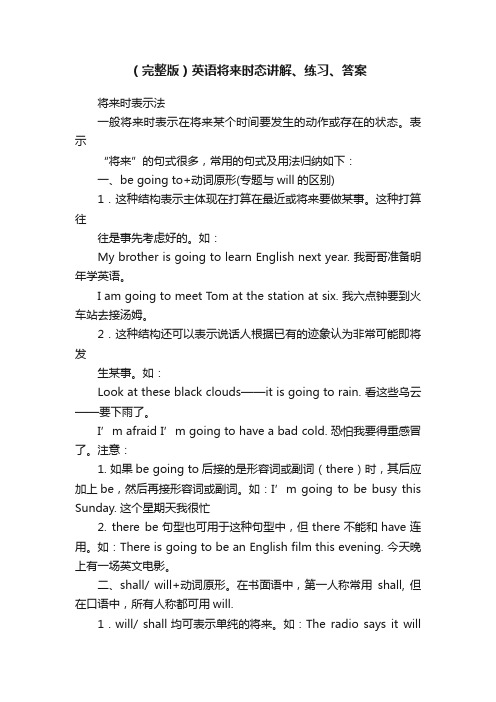
(完整版)英语将来时态讲解、练习、答案将来时表示法一般将来时表示在将来某个时间要发生的动作或存在的状态。
表示“将来”的句式很多,常用的句式及用法归纳如下:一、be going to+动词原形(专题与will的区别)1.这种结构表示主体现在打算在最近或将来要做某事。
这种打算往往是事先考虑好的。
如:My brother is going to learn English next year. 我哥哥准备明年学英语。
I am going to meet Tom at the station at six. 我六点钟要到火车站去接汤姆。
2.这种结构还可以表示说话人根据已有的迹象认为非常可能即将发生某事。
如:Look at these black clouds——it is going to rain. 看这些乌云——要下雨了。
I’m afraid I’m going to have a bad cold. 恐怕我要得重感冒了。
注意:1. 如果be going to后接的是形容词或副词(there)时,其后应加上be,然后再接形容词或副词。
如:I’m going to be busy this Sunday. 这个星期天我很忙2. there be句型也可用于这种句型中,但there不能和have连用。
如:There is going to be an English film this evening. 今天晚上有一场英文电影。
二、shall/ will+动词原形。
在书面语中,第一人称常用shall, 但在口语中,所有人称都可用will.1.will/ shall均可表示单纯的将来。
如:The radio says it willbe cloudy tomorrow. 收音机报道明天多云。
2.表示预料中将要发生的动作或情况。
如:You’ll feel better after having this medicine.吃了这药,你就会感到好些的。
将来时理论及练习 1
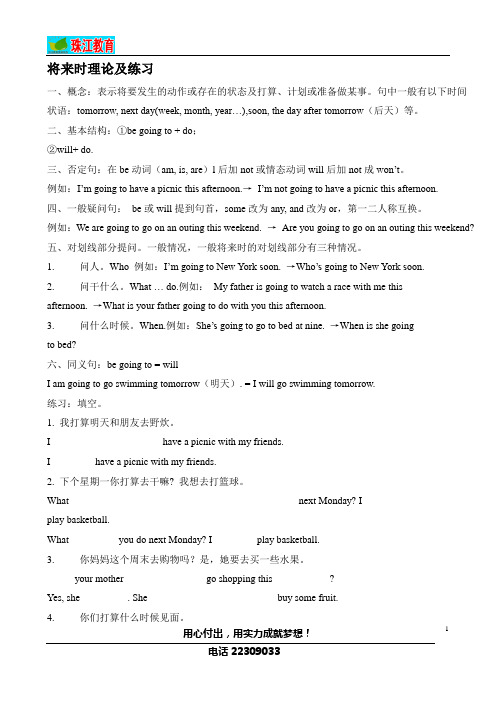
用心付出,用实力成就梦想!电话223090331将来时理论及练习一、概念:表示将要发生的动作或存在的状态及打算、计划或准备做某事。
句中一般有以下时间状语:tomorrow, next day(week, month, year…),soon, the day after tomorrow(后天)等。
二、基本结构:①be going to + do;②will+ do.三、否定句:在be动词(am, is, are)l后加not或情态动词will后加not成won’t。
例如:I’m going to have a picnic this af ternoon.→I’m not going to have a picnic this afternoon.四、一般疑问句:be或will提到句首,some改为any, and改为or,第一二人称互换。
例如:We are going to go on an outing this weekend. →Are you going to go on an outing this weekend?五、对划线部分提问。
一般情况,一般将来时的对划线部分有三种情况。
1. 问人。
Who 例如:I’m going to New Y ork soon. →Who’s going to New Y ork soon.2. 问干什么。
What … do.例如:My father is going to watch a race with me thisafternoon. →What is your father going to do with you this afternoon.3. 问什么时候。
When.例如:She’s going to go to be d at nine. →When is she goingto bed?六、同义句:be going to = willI am going to go swimming tomorrow(明天). = I will go swimming tomorrow.练习:填空。
- 1、下载文档前请自行甄别文档内容的完整性,平台不提供额外的编辑、内容补充、找答案等附加服务。
- 2、"仅部分预览"的文档,不可在线预览部分如存在完整性等问题,可反馈申请退款(可完整预览的文档不适用该条件!)。
- 3、如文档侵犯您的权益,请联系客服反馈,我们会尽快为您处理(人工客服工作时间:9:00-18:30)。
将来时理论及练习
Class班级______ Name姓名______
一、概念:表示将要发生的动作或存在的状态及打算、计划或准备做某事。
句中一般有以下时间状语:
tomorrow, next day(week, month, year…),soon, the day after tomorrow(后天)等。
二、基本结构:
①be going to + do;
②will+ do.
三、否定句:在be动词(am, is, are)l后加not或情态动词will后加not成won’t。
例如:I’m going to have a picnic this afternoon.→ I’m not going t o have a picnic this afternoon.
四、一般疑问句:be或will提到句首,some改为any, and改为or,第一二人称互换。
例如:We are going to go on an outing this weekend. → Are you going t o go on an outing this weekend?
五、对划线部分提问。
一般情况,一般将来时的对划线部分有三种情况。
1. 问人。
Who 例如:I’m going to New York soon. →Who’s going to New York soon.
2. 问干什么。
What … do.
例如:My father is going to watch a race with me this afternoon.
→What is your father going to do with you this afternoon.
3. 问什么时候。
When.
例如:She’s going to go to bed at nine.
→Whe n is she going to bed?
六、同义句:be going to = will
I am going to go swimming tomorrow(明天). = I will go swimming tomorrow.
练习
一、填空。
1. 我打算明天和朋友去野炊。
I_____ _______ _________ have a picnic with my friends.
I ________ have a picnic with my friends.
2. 下个星期一你打算去干嘛? 我想去打篮球。
What ________ ________ _________ _________ _________ next Monday?
I _______ ______ _____ play basketball.
What _________ you do next Monday? I ________ play basketball.
3. 你妈妈这个周末去购物吗?是,她要去买一些水果。
_____ your mother _______ ________ go shopping this ___________?
Yes, she _________. She ______ ________ __________ buy some fruit.
4. 你们打算什么时候见面。
What time _______ you _________ __________ meet?
二、改句子。
5. Nancy is going to go camping.(改否定)
Nancy ________ going to go camping.
6. I’ll go and join them.(改否定)
I _______ go ______ join them.
7. I’m going to get up at 6:30 tomorrow.(改一般疑问句)
________ _______ ________ to get up at 6:30 tomorrow?
8. We will meet at the bus stop at 10:30.(改一般疑问句)
_______ ________ meet at the bus stop at 10:30.
9. She is going to listen to music after school.(对划线部分提问)
________ _______ she ________ ________ _________ after school?
10. My father and mother are going to see a play the day after tomorrow.(同上)
_________ _________ going to see a play the day after tomorrow.
三、用所给词的适当形式填空。
11. Today is a sunny day. We ___________________ (have) a picnic this afternoon.
12. My brother _______________ (go) to Shanghai next week.
13. Tom often ______________(go) to school on foot. But today is rain.
He ______________ (go) to school by bike.
14. What do you usually do at weekends?
I usually __________ (watch) TV and ____________(catch) insects?
15. It’s Friday today. What _____she _________ (do) this weekend?
She ______________ (watch) TV and _____________ (catch) insects.
16. What ___________ (d0) you do last Sunday? I ____________ (pick) apples on a farm.
What ______________ (do) next Sunday? I ______________ (milk) cows.
17. Mary ____________ (visit) her grandparents tomorrow.
18. Liu Tao ____________ (fly) kites in the playground yesterday.
19. David ______________ (give) a puppet show next Monday.
20. I ________________ (plan) for my study now。
